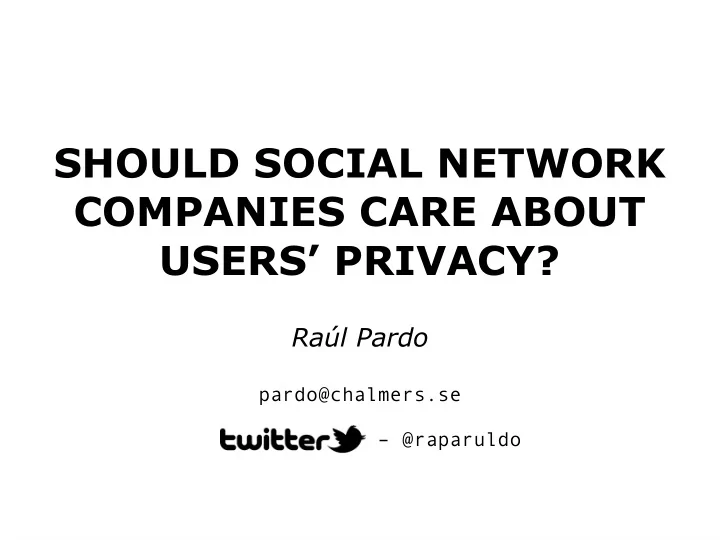

SHOULD SOCIAL NETWORK COMPANIES CARE ABOUT USERS’ PRIVACY? Raúl Pardo pardo@chalmers.se – @raparuldo
OUTLINE ● “Define” privacy ● Look at privacy issues in Social Network Sites (SNS) – Ethically – Theoretically (Informational privacy)
WHAT IS PRIVACY? ● Privacy is a basic human need ● Unfortunately there is no concrete description of “privacy”
CONCEPTUALISATION OF PRIVACY - POSITIVELY ● Individual's control over his/her intimacy in four dimensions: – Physical dimension – Personal space – Personal integrity – Psychological dimension – Social dimension – Interactions with other – Information dimension – Personal data
CONCEPTUALISATION OF PRIVACY - NEGATIVELY ● Four privacy problems (Solove 2008) – Information collection – Information processing – Information dissemination – Invasion of one's private sphere
PRIVACY PROTECTION ● Legal protection – Basic Human Right (Art. 12 in UN Human Rights Declaration) – Cumbersome and inconsistent ● Ethical self-regulation – No legal consequences – Context-dependent (contextual framework) – Ethic codes, professional norms, … ● Privacy Enhancing-Technologies (PET) – Hardware and software tools for access control – These tools can be bypassed or hacked
CONTEXTUAL FRAMEWORK ● Privacy invasion happens if – Expectations in the established context are breached – Moving information from a new flow to a “morally superior” context of norms
ETHICAL JUSTIFICATION OF PRIVACY - POSITIVE ● Privacy is regarded as: – Inherent value – Interrelated with other values ● Freedom, equality, justice, self-fulfilment, trust and variety in relationships. ● Self-determination as an intrinsic value – And so is informational self-determination ● “guards the borders among different societal contexts”
ETHICAL JUSTIFICATION OF PRIVACY - NEGATIVE ● Breaking privacy harm others – No harm principle ● Cost-benefit analysis (contextual framework) – Media-ethics ● If no other means are available for obtaining the needed information ● The existence of an overriding public interest
THE CONTEXTUAL FRAMEWORK ● Two minor flaws: – Preference for existing norms ● “Tyranny of the normal” – Restricted autonomy for individuals ● Possible remedy – Informed consent ● Proactive opt-in against retroactive opt-out
OPTOUT ADS IN FACEBOOK
MORAL PRINCIPLES OF PRIVACY PROTECTION ● The positive right to self-determination and the negative duty to minimise harm require a fair distribution of costs and benefits , determined by the comparison of the existing and the intended flow of information. ● Individuals must have access to informed and positive consent (opt-in) when their context appropriate flow of personal information is in danger of being breached. ● An overriding interest in privacy invasion is justified only under special circumstances, such as a threat to public security or the individual , and only when no other, less invasive procedures would reach the same goal.
PRIVACY PROTECTION IN ONLINE SOCIAL NETWORKS ● Potential risks – Company ● Unauthorised used of information (e.g. government, third party companies, …) – Other users ● Cyber-stalking ● Harassment ● Reputation damage ● ...
PRIVACY PROTECTION IN ONLINE SOCIAL NETWORKS ● Potential risks – Vertical axis – Systematic collection, aggregation and use of data by the networking company. – Horizontal axis – Social interactions among users.
PRIVACY PROTECTION IN ONLINE SOCIAL NETWORKS ● Insufficient and misleading privacy practices – “Friends only” setting can be easily bypassed. ● Default privacy settings at the lowest, most open level and opt-out procedures. – Careless users
PRIVACY PROTECTION IN ONLINE SOCIAL NETWORKS ● Two cases of violation of privacy which had some effect – News Feed – Beacon broadcast of shopping activities
ETHICS OF SELF-RESTRAINT ● Network owners and third parties are expected to follow principles of fair information practices. ● Users have a responsibility to be sufficiently educated about their choices and actions in social media. – Privacy-literate users ● Ethicists, educators, system developers and system developers are responsible for creating an environment that fosters privacy literacy among the users of social media and society as a whole.
INFORMATIONAL PRIVACY ● Westin – States that people aim to achieve a situational balance between private and open behaviour ● Altman – Emphasizes that privacy is inherently a social and dynamic process of optimization between disclosure and withdrawal ● Autonomous control and limited access to an individual's self
INFORMATIONAL PRIVACY ● Definition. – What information will be made available in which way, to whom, when and to what extend. ● Concerns: – Autonomy – User's control – Restriction of access to private information
INFORMATIONAL PRIVACY IN SOCIAL NETWORKS ● Privacy issues may occur when the user misinterprets the communication service – Autonomy – Loss of control
SNS PROVIDER VIEW OF PRIVACY ● Maximise the amount of information users provide and the public visibility – Economy – Network ● Privacy may be seen as an obstacle for SNS providers
SNS USER VIEW OF PRIVACY ● Factors of informational privacy that could be affected – Individual autonomy ● Privacy paradox – Access restriction ● User awareness of the consequences of his/her actions (Autonomy issue) – Control ● Need for a fine-grained mechanism to create online identities (Loss of control issue)
SHOULD SOCIAL NETWORK COMPANIES CARE ABOUT USERS’ PRIVACY? Raúl Pardo pardo@chalmers.se – @raparuldo
SHOULD SOCIAL NETWORK S COMPANIES CARE ABOUT E USERS’ PRIVACY? Y Raúl Pardo pardo@chalmers.se – @raparuldo
THANK YOU VERY MUCH FOR YOUR ATTENTION
Recommend
More recommend